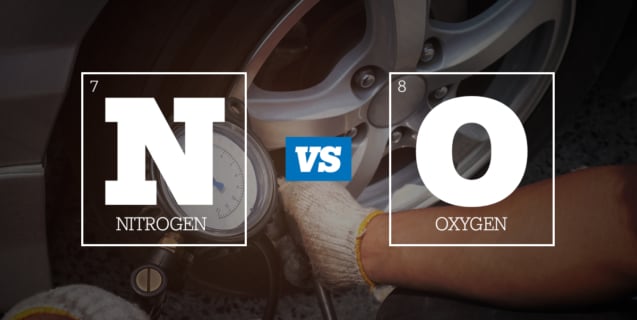The wheels on the bus, (or your car for that matter) do not continue to go round and round without a little TLC from you or your local mechanic. After all, what is a vehicle without tires? Pretty much a useless pile of metal and rubber. So it’s important to perform regular tire pressure checks and tire rotations to ensure your tires last their full life cycle and keep you safe on the road. In recent years, mechanics and automotive experts have followed the path of the racing community and have been recommending filling your vehicle tires with pure nitrogen instead of air. To fully understand the benefits of nitrogen versus air, let’s look at some of the facts.
What is the difference between nitrogen and air?
Tires filled with regular air are more specifically filled with 78% nitrogen, 21% oxygen and 1% miscellaneous gases (neon and argon). The alternative is filling your tires with 100% nitrogen. With both options containing primarily nitrogen, you might ask yourself how such a small amount of nitrogen could make a difference. While there is nothing wrong with using regular air for your tires, many experts point to the following advantages to using 100% nitrogen in your tires.
- Longer lasting tire pressure = longer lasting tires – Maintaining proper tire pressure is essential to the life span of your tires and nitrogen filled tires lose pressure slower than those filled with ordinary air leading to a longer life cycle.
- Better gas mileage – When your tires are properly inflated and maintain consistent pressure, you can experience slightly better fuel consumption
- Easier on the rubber – Oxidation created by oxygen can make the rubber on your tires brittle, wearing them out faster and increasing your chance of a blow-out. Pure nitrogen prevents this from occurring.
- Lean and green – Tires lasting longer reduces the demand for rubber and logically, decreases emissions in the atmosphere by reducing the need to manufacture and ship tires. This may be a marginal decrease but the fact remains that nitrogen could be labeled the more environmentally friendly option.
- Performance under pressure – Racing professionals believe that nitrogen performs better with big temperature swings and holds more consistent pressure when things heat up.
The truth is there is no wrong choice and there is an increased cost associated with filling your tires with pure nitrogen. If you do choose to go the nitrogen route, don’t skip your regular tire pressure checks and tire rotations. And always pay attention to your tire pressure monitoring system. (TMPS) The majority of vehicles on the road today are equipped with this sensor that illuminates when tire pressure is off.
Like a race car, the automotive industry moves at a rapid pace and automotive technology is constantly evolving. If you’ve always been the mechanically inclined type and enjoy immersing yourself in how things work, maybe a career as an automotive technician is right for you! J-Tech Institute’s automotive technology program is helping students get the hands-on training they need to become certified automotive technicians. The skilled instructors at J-Tech offer real world experience with a variety of schedule options so you are sure to find one that is right for you! Call J-Tech Institute today to learn more about how you can be a part of the talented professionals keeping the world on the move.
